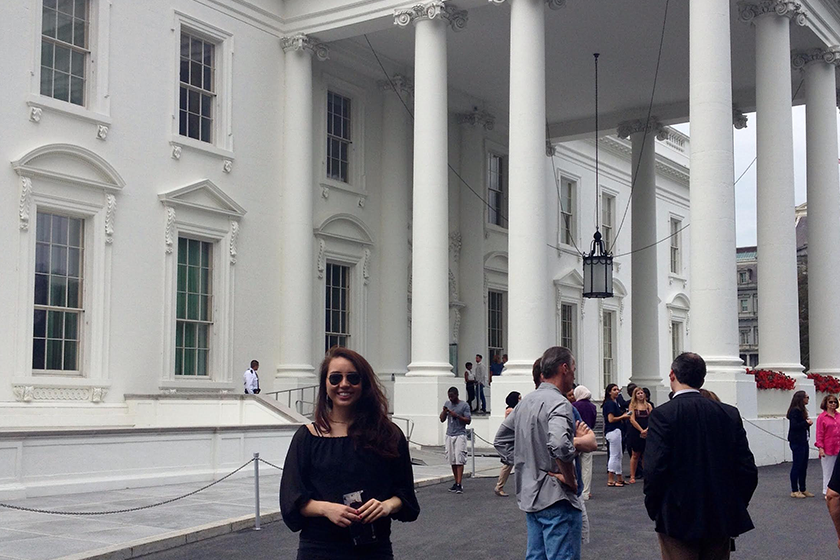The first piece of writing I ever did in law school was about how much I regretted going to law school. The piece was a short reflective paper for Professor Nancy Knauer – my professional development advisor – about how difficult I found my first year foundational courses to be and how lost I felt in them. I wrote: “My greatest struggle in my first year thus far has been to remain focused and motivated on a day-to-day basis. I yearn for more meaningful discourse with my peers about our desire to change the status quo as opposed to our mutual fears of cold-calls in Contracts. I miss translating what I learn in the classroom to practical skills, and while the end goal of serving in the field of public interest law still inspires me, this year has been a greater struggle than I had anticipated.”
Upon reading my less-than-enthusiastic paper, Professor Knauer pulled me aside and encouraged me to keep focused. She reminded me about the importance of knowing the nuances of contract and property law when representing disadvantaged clients and that, while it did not seem clear to me now, there was a place in law school for someone like me.
“By learning to focus on the smallest details, I began to change my frame of thinking and value the ways in which lawyers are taught to make thoughtful and deliberate choices.”
I did not come to law school to become a litigator or to work in private practice. Rather, I wanted to learn the law so I could implement big, systemic policy changes. Having worked with various refugee resettlement organizations and a legal aid clinic for unaccompanied immigrant children, I witnessed the daily challenges facing these populations. More importantly, I recognized the political, legal, and administrative barriers faced by the lawyers and social service providers who aimed to advocate on behalf of them. I was eager to utilize my analytical skills to engage with and ultimately change federal immigration policies, and I knew I would not be able to do that without grasping the fundamentals of immigration law and the asylum adjudication process.
But focusing on the long-term made staying engaged with the “now” a challenge. Getting through even the most basic legal concepts felt like pulling teeth. To help me gain perspective, Professor Knauer offered this: “For someone like you with a big-picture view of the world, law school will teach you about the importance of being bored. Without learning how to be meticulous with every step of the process, you will see that the big picture falls apart.”
Thus, “learning to be bored” became my law school motto. Every time I found myself struggling in my classes, I took each assignment as a skill-building lesson in being meticulous with “boring” statutes, codes, and procedures. By learning to focus on the smallest details, I began to change my frame of thinking and value the ways in which lawyers are taught to make thoughtful and deliberate choices. By utilizing the details, we are taught to actualize abstract concepts into applicable, systematic processes.
In short, “learning to be bored,” allowed me to build the skills necessary to succeed in non-traditional legal settings. For my 1L summer, I worked as an intern at a national immigration advocacy organization in Washington D.C. through the Temple Law and Public Policy Program. Although I did very little “legal” work, I engaged with legal concepts on a daily basis. From cases discussing administrative law to writing about the complexities of immigration detainers for local law enforcement, I utilized the skills I built in the classroom to address very complex, structural problems and incorporate them into memos and talking points that were geared towards lawyers and non-lawyers, alike.
I also recently reflected on the importance of my legal education at the Second Global Think Tank Summit in Milan, Italy, where I served as the conference rapporteur for the Think Tanks and Civil Societies Program at the University of Pennsylvania. Because of my research interests in immigration and refugee law, I attended the conference to engage with representatives from important think tanks from around the globe on the current European migratory crisis. As I listened to the conference attendees discuss complex migration issues, it became clear to me that the nuances of the law would sometimes get lost in “big picture” discussions. Without understanding the plight of each migrant within the context of a nation’s immigration system, for example, the policies would inevitably fail to capture the real-life needs of these populations. Additionally, without recognizing the importance of word choice – i.e. “economic migrant” from “refugee” – we risk undermining the strength of the legal international refugee law regime. While I, by no means, felt more qualified than the brilliant researchers and data wizards I met, I firmly believe that my legal education brought a unique perspective and helped me “spot the issues” as we often do on law school exams.
I still do not see myself ever stepping foot in a courtroom, but I recognize now that my legal education is as equally valuable to me as it is for my classmates who will become future prosecutors or transactional attorneys. And when I learned to confront my challenges, focus on the details, and become creative with my “non-traditional” legal career, I found myself a lot less bored and a lot more inspired.



1 Comment